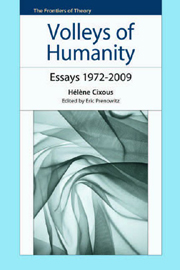Book contents
- Frontmatter
- Contents
- Sources
- Series Editor's Preface
- Introduction: Cixousian Gambols
- 1 Fiction and Its Phantoms: A Reading of Freud's Das Unheimliche (The ‘Uncanny’)
- 2 The Character of ‘Character’
- 3 Missexuality: Where Come I Play?
- 4 The Pleasure Reinciple or Paradox Lost
- 5 Reaching the Point of Wheat, or A Portrait of the Artist as a Maturing Woman
- 6 Letter to Zohra Drif
- 7 The Names of Oran
- 8 The Book as One of Its Own Characters
- 9 How Not to Speak of Algeria
- 10 The Oklahoma Nature Theater Is Recruiting
- 11 The Book I Don't Write
- 12 The Unforeseeable
- 13 Passion Michel Foucault
- 14 Promised Cities
- 15 Volleys of Humanity
- Acknowledgements
- Index
2 - The Character of ‘Character’
Published online by Cambridge University Press: 12 September 2012
- Frontmatter
- Contents
- Sources
- Series Editor's Preface
- Introduction: Cixousian Gambols
- 1 Fiction and Its Phantoms: A Reading of Freud's Das Unheimliche (The ‘Uncanny’)
- 2 The Character of ‘Character’
- 3 Missexuality: Where Come I Play?
- 4 The Pleasure Reinciple or Paradox Lost
- 5 Reaching the Point of Wheat, or A Portrait of the Artist as a Maturing Woman
- 6 Letter to Zohra Drif
- 7 The Names of Oran
- 8 The Book as One of Its Own Characters
- 9 How Not to Speak of Algeria
- 10 The Oklahoma Nature Theater Is Recruiting
- 11 The Book I Don't Write
- 12 The Unforeseeable
- 13 Passion Michel Foucault
- 14 Promised Cities
- 15 Volleys of Humanity
- Acknowledgements
- Index
Summary
I. Introduction
What exactly is ‘character’? How is it possible at present to think of the ‘concept’ of ‘character’ – if it is a concept? Assuming that this concept has a history, how far are we along now in this history or in the examination of this history? What does ‘character’ name? These questions are, on the one hand, involved in a whole system of critical presuppositions and crop up from traditional discussions about literature, within a conception of literary creation that is today outmoded. But, on the other hand, these same questions, having cropped up out of a disintegrating system, allow, through displacement, for the emergence of new, prying questions opening out onto the unknown of a text rather than its recognisable development; onto life, the incessant agitation of literary practice rather than its theses and its stability; onto its indescribable, unidentifiable aspects rather than its rules and means of being classified. To be more precise, it is with the removal of the question of ‘character’ that the question of the nature of fiction comes to the fore, as well as the examination of subjectivity – through fiction, in fiction, and as fiction: where the term ‘fiction’ should not be taken simply (in the sense of borne in mind) as part of a pair of opposites, which would make it the contrary of ‘reality’.
- Type
- Chapter
- Information
- Volleys of HumanityEssays 1972–2009, pp. 41 - 60Publisher: Edinburgh University PressPrint publication year: 2011



